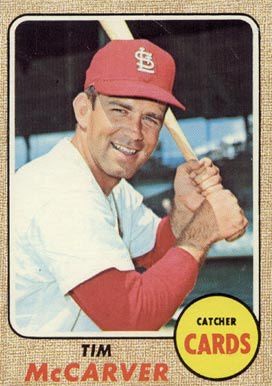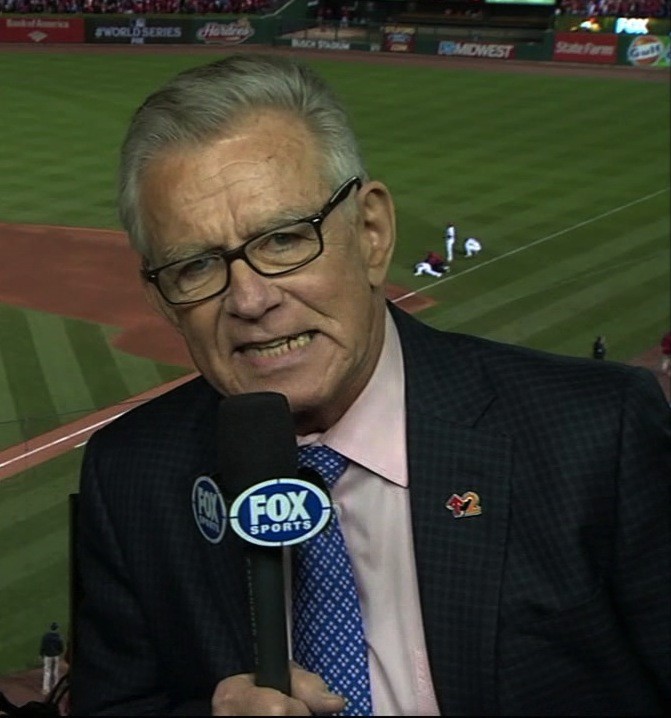
My father enjoyed sharing three celebrity tales from his youth in Memphis. The first involved a chance encounter with St. Louis Cardinals legend Stan Musial at Russwood Park in 1953 (when Dad was 11 years old). The second was a brief visit with Elvis Presley at Katz Drug Store in 1956. And the third story he’d tell regularly was an account of the football game he played — for Central High School — against local legend Tim McCarver (and Christian Brothers) in 1958. The fact that football was merely McCarver’s second sport somehow inflated the legend of a fellow Memphian who went on to fame and fortune, first as a catcher for the Cardinals, then as a Hall of Fame broadcaster. My dad was an only child, so I came to view McCarver as the equivalent of a displaced, very famous relative: “Uncle Tim.”
This is a big year for McCarver’s legacy as a baseball player. It’s the 50th anniversary of the 1967 world champion Cardinals, known to history as “El Birdos,” primarily because of the impact Orlando Cepeda (a Puerto Rican native) made on the team upon being acquired the year before from the San Francisco Giants. Cepeda earned National League MVP honors that year after leading the circuit with 111 RBIs. Who finished second in the 1967 MVP voting? Tim McCarver.

Just last month, McCarver was elected to the Cardinals Hall of Fame. He’ll be inducted in August along with steroid-stained slugger Mark McGwire and one of the key members of the Gas House Gang from the 1930s, Pepper Martin. And McCarver’s induction is a bit overdue. He wore the tools of ignorance for three pennant winners and two world champions in St. Louis. Only Adam Wainwright and Yadier Molina have started more games as a battery for the Cardinals than did Hall of Famer Bob Gibson and McCarver.
McCarver spent most of the 1970s in Philadelphia where he became the personal catcher for another Hall of Fame-bound hurler, Steve Carlton (a man he first caught in St. Louis). Carlton and McCarver were so closely linked that speculation grew the pair would eventually be buried sixty feet, six inches apart. When McCarver played six games for the Phillies in 1980, he became the rare man to have played major-league baseball in four different decades.
McCarver’s view from behind the plate helped him transition rather smoothly into the broadcast booth, first with the Phillies, then for many years with the New York Mets’ cable station, WWOR. McCarver’s cerebral style competed for attention with his play-by-play partner, Ralph Kiner, who became known as much for his malaprops in the booth as for the 369 homers he hit in ten seasons, most with the Pittsburgh Pirates. (“On Father’s Day, we again wish you all happy birthday.”)
His skills as an analyst took McCarver back to the World Series, where he called the 1985 Fall Classic as a late replacement for Howard Cosell. He went on to call 23 more World Series, the most for any broadcaster in history. And he gained his share of critics, in large part for the cerebral approach that worked so well in the Mets’ booth with Kiner. There are fans who feel McCarver aims to speak above his audience, never settling for a two-syllable word when four will do. (He titled his 1998 book Baseball for Brain Surgeons and Other Fans. Awkward title, but it’s a terrific read.)
McCarver hasn’t forgotten his hometown. During his acceptance speech at the 2012 National Baseball Hall of Fame induction ceremony — he received the Ford C. Frick Award for broadcasting excellence — McCarver announced a donation to build a baseball complex for kids in Memphis. “I learned the game in Memphis, Tennessee, on long-ago fields . . . . The hope is that some of these African-American kids will become major-league baseball players.” [Sources were unable to confirm where in the planning stage this project currently sits.]
“Uncle Tim” is now 75 years old. Though he’s no longer in the booth for the World Series, you can hear him now and then on the Cardinals’ regional Fox broadcasts. It’s been a long time since his football team beat my dad’s (7-0) on the gridiron. Long enough for some perspective on the size and weight of Tim McCarver’s impact since he left Memphis more than half a century ago. He’s a member of a few halls of fame now. When we finally get around to an organized, formal Memphis Sports Hall of Fame, you can count on Tim McCarver being a charter member.